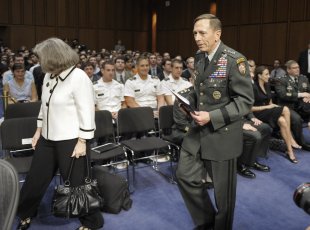Scientists have identified a new gene variant that seems to strongly raise the risk for Alzheimer's disease, giving a fresh target for research into treatments for the mind-robbing disorder.
The problem gene is not common — less than 1 percent of people are thought to have it — but it roughly triples the chances of developing Alzheimer's compared to people with the normal version of the gene. It also seems to harm memory and thinking in older people without dementia.
The main reason scientists are excited by the discovery is what this gene does, and how that might reveal what causes Alzheimer's and ways to prevent it. The gene helps the immune system control inflammation in the brain and clear junk such as the sticky deposits that are the hallmark of the disease. Mutations in the gene may impair these tasks, so treatments to restore the gene's function and quell inflammation may help.
"It points us to potential therapeutics in a more precise way than we've seen in the past," said Dr. William Thies, chief medical and scientific officer of the Alzheimer's Association, which had no role in the research. Years down the road, this discovery will likely be seen as very important, he predicted.
It is described in a study by an international group published online Wednesday by the New England Journal of Medicine.
About 35 million people worldwide have dementia, and Alzheimer's is the most common type. In the U.S., about 5 million have Alzheimer's. Medicines such as Aricept and Namenda just temporarily ease symptoms. There is no known cure.
Until now, only one gene — ApoE — has been found to have a big impact on Alzheimer's risk. About 17 percent of the population has at least one copy of the problem version of this gene but nearly half of all people with Alzheimer's do. Other genes that have been tied to the disease raise risk only a little, or cause the less common type of Alzheimer's that develops earlier in life, before age 60.
The new gene, TREM2, already has been tied to a couple other forms of dementia. Researchers led by deCODE Genetics Inc. of Iceland honed in on a version of it they identified through mapping the entire genetic code of more than 2,200 Icelanders.
Further tests on 3,550 Alzheimer's patients and more than 110,000 people without dementia in several countries, including the United States, found that the gene variant was more common in Alzheimer's patients.
"It's a very strong effect," raising the risk of Alzheimer's by three to four times — about the same amount as the problem version of the ApoE gene does, said Dr. Allan Levey, director of an Alzheimer's program at Emory University, one of the academic centers participating in the research.
Researchers also tested more than 1,200 people over age 85 who did not have Alzheimer's disease and found that those with the variant TREM2 gene had lower mental function scores than those without it. This adds evidence the gene variant is important in cognition, even short of causing Alzheimer's.
"It's another piece in the puzzle. It suggests the immune system is important in Alzheimer's disease," said Andrew Singleton, a geneticist with the National Institute on Aging, which helped pay for the study.
One prominent scientist not involved in the study — Dr. Rudolph Tanzi, a Harvard Medical School geneticist and director of an Alzheimer's research program at Massachusetts General Hospital — called the work exciting, but added a caveat.
"I would like to see more evidence that this is Alzheimer's" rather than one of the other dementias already tied to the gene, Tanzi said. Autopsy or brain imaging tests can show whether the cases attributed to the gene variant are truly Alzheimer's or misdiagnosed, he said.
___
Online:
Medical journal: http://www.nejm.org
Alzheimer's info: http://www.alzheimers.gov
Alzheimer's Association: http://www.alz.org
___
Marilynn Marchione can be followed at http://twitter.com/MMarchioneAP




